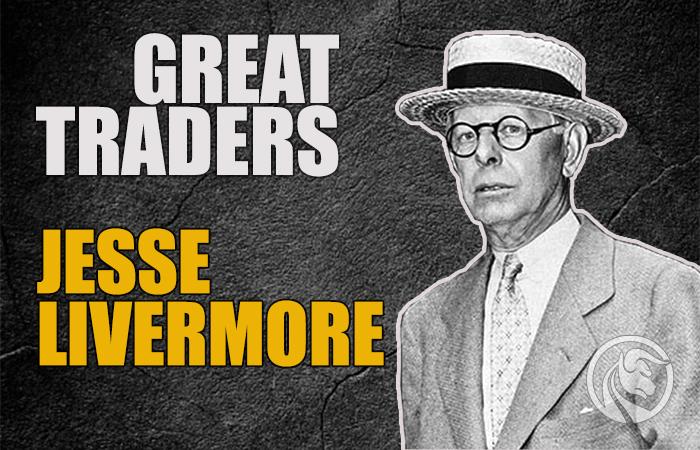Jesse Livermore - the phoenix among the speculators
Jesse Livermore is considered by many to be one of the greatest traders in history. His view of the market is popular even 80 years after his death. His stock market career resembled a mythical phoenix. Also Livermore "Rose from the ashes" what they were bankruptcy. Because after each insolvency, he was able to regain his fortune thanks to successful speculation on the stock exchange. Contrary to popular belief, for most of his stock exchange career he was not a day trader. His investment strategy was more akin to swing tradingor long-term trading. The history of the trader until the beginning of the 20s is described in the book Reminiscences of a Stock Operatorwritten by Edwin Lefevre. Jesse Livermore himself published the book How to Trade in Stocks: The Livermore Formula for Combining Time Element and Pricewhere he presented his investment strategy.
Jesse Livermore - The beginning of a career
Jesse Lauriston Livermore was born in the United States in 1877. He spent his childhood in Shrewsbury, Massachusetts. He grew up in a poor family, but did not neglect his education. Already at the age of 3,5, he learned to read and write. At the age of five, he read newspapers and skimmed financial columns. At the age of 14, his father instructed young Jesse to leave school and start working on a farm. Livermore had other plans for his career and joined a finance firm Paine Webber. His earnings were $ 5 a week. The young Jesse began to track company tickers in newspapers and realized that the price movements were not random. At the age of 15, he made his first transactions. IN "Bucket shop" (in simplified terms, today's counterpart market maker broker). From his $ 5 investment (a week's salary), he made $ 3,12.
New York and the road to fame
The first successes on the stock exchange led Livermore to quit his job and start trading on the stock exchange, where he used Boston bucket shops. The success and gaining a "small fortune" of $ 10 attracted the attention of bucket shops. As a result, he was forbidden to trade. This prompted him to leave Boston and move to New York City in 1899.
The first major success came in 1901, when he invested in stocks at the age of 24 Northern Pacific Railway. Another good investment was taking a short position in stocks Union Pacific shortly before the 1906 San Francisco earthquake. He was truly famous in 1907, when he used the panic of this period to make money short. In one day, he made $ 1 million. He spent his investment profits on a luxurious life (yacht, apartments, cars). He quickly lost money investing in cotton. Already 5 years after the memorable panic of 1907, his debts exceeded $ 1 million. In 1915, he was forced to file for bankruptcy due to his inability to service his debts.
The period after the First World War
The following years were a series of successes on the investment market. Jesse Livermore made a fortune trading wheat and Cottonand also participated in short squeeze on shares Piggly Wiggly. Just before the Great Depression, Livermore began to build a large short position in the market. So that the item is not too visible, used around 100 brokers for this purpose. A carefully built short position generated increasing losses. Just before the bubble burst, positions were trading at around $ 6 million "Paper loss", however, shortly thereafter there were great drops (including Black Thursday) that made it the entire trade ended in a profit of $ 100 million on short positions. Fame contributed to giving him a nickname Great Bear of Wall Street. Many investors did not like it "Non-american" earning on inheritance. As a result of receiving numerous death threats, he hired an armed bodyguard.
The lavish life, failed marriages and transactions resulted in the fact that wealth was significantly depleted. In 1934 he had to file for bankruptcy again. He was suspended from membership rights Chicago Board of Trade due to insufficient cash. However, that was not his last word. He bounced off the bottom and started making money on the stock exchange again. In 1939, he decided to "diversify" his activities. Started financial consulting as well started selling trading systems based on technical analysis (The Livermore Market Key). In 1940, he had a fortune of $ 5 million. However, the untreated depression made itself felt. On November 28, 1940, he committed suicide in the locker room of the Sherry Netherland Hotel in Manhattan.
Jesse Livermore's strategy
Jesse Livermore generally avoided "investment advice" and market gossip. He focused on price fluctuations. He did not care about the reason for the rise or fall in prices, he was interested in the movement itself. So he was a typical supporter of broadly understood technical analysis.
Livermore has not been recognized as a great trader simply because of earning great wealth in the market. He also became one thanks to the fact that he often drew conclusions from his mistakes. At the same time, he was aware of his trading skills, which allowed him to quickly recover from numerous bankruptcies.
Here are the most popular thoughts about speculating in the market:
- Nothing new is happening in speculating - greed and fear have always accompanied traders, regardless of the "advancement" of human civilization. You can see it from the bubbles that have grown and burst over the centuries. From tulip mania, East India Company or dotcom.
- Price moves along the line of least resistance - it is one of the "most important pieces of advice". You shouldn't think too much about the market (overthinking), just follow the price movement. If the market wants to grow, it doesn't matter what the fundamentals are - it will grow. It should be remembered that if there are more buyers than sellers, the price will rise according to the law of demand.
- Don't try to catch every move - the speculator should avoid trying to catch every move of the price. This means that in the bull market, the trader should focus on finding a place to take a long position, while in a downtrend, avoid taking long positions. Livermore advised to avoid the phenomenon overtradingu (too frequent trading). The above-mentioned advice is compatible with another - you don't have to trade.
- Good transactions are characterized by quick profit - according to Livermore, the best deals show profits right at the opening. If the market is moving against the trader, don't increase your position, but get ready to cut your loss quickly.
- Practice makes perfect - you should hone your trading craft and avoid it "Market gambling"that is, taking positions under the influence of emotions that contradict the system. The lack of professionalism of traders is their way to ruin. However, science alone is not enough, you should practice trading and not focus solely on the "scientific stage" that will lead to finding the "Holy Grail".
- There is only one side of trade, the right one Livermore advises not to be a "one armed speculator" who only focuses on the long or short side of the market. You should follow the trend no matter what it is.
- Don't risk too much - the speculator should avoid too large a position in relation to his character. Livermore put it in very simple terms: "if the position you have entered causes you to be unable to sleep after the night, reduce it to a level that will give you a good night's sleep."
- Wait for the breakout during a sideways trend - Livermore was a supporter of the game with the trend. For this reason, the periods of consolidation were his worst times, false breaks that resulted in losses. Therefore, he believed that it is necessary to wait for confirmation of the breakout from consolidation in order to connect to the prevailing trend.
- Don't fight the market - you should always respect the prevailing trend and not be wiser than it. If the market continues to decline despite assuming a long position, think about accepting your losses rather than believing that "the market is wrong".
- They don't speculate for emotions Trading is hard work and should not be confused with roulette or horse racing. Do not take the position "for fun" or "for the thrill." The purpose of investing in the stock market is to earn. Emotions should be looked for outside of it.
- Don't be afraid to lose - taking care of your own wallet should be more important than protecting your ego. In the market, the investor has to earn money, not focus on being right. Losses are an inherent part of speculation and the trader must come to terms with it.
- The price is never too high to buy and too low to sell - this is especially important for traders who speculate in a very exciting market period. This applies to both the buying panic and the sell panic. This was evident during the fashion for technology companies during the dotcom bubble and the declines in 2007-2009.
- Never average losses - this is the basic mistake of speculators who do not want to admit defeat. Instead of cutting losses, they still believe that the market "doesn't understand the situation." As a result, it takes long positions during a downtrend and short positions during an uptrend. The result is that it "averages the price." However, the cost of this averaging is increasing exposure, which increases the risk.
- It's not good when you focus too much on the reasons for the price movement - it is especially important during the publication of financial results by companies or macroeconomic news. Too long analysis of the reasons for a price change may result in "adopting a specific point of view" that will distort the perception of a price change. Also, do not focus on the "hype" that tries to explain even the smallest price movement. Those who speculate on the basis of technical analysis should distance themselves from this.
- Don't turn short-term speculation into a long-term investment - it is a common mistake of speculators, behind which there is a reluctance to admit a mistake. If the reason for taking a position was the desire to catch a short-term price movement, then in the event of failure, one should not wait for the "approaching fire". You should accept that not every transaction goes out.
- Don't focus on getting paid quickly - many traders want to get rich very quickly. Investors on all sides are "bombarded" with information about instantly becoming a millionaire as a result investment in options, cryptocurrencies or individual companies. However, it should be remembered that these are isolated cases. Every week someone in Europe becomes a millionaire by playing the lottery. However, playing Lotto is not a guarantee of becoming a millionaire. For this reason, a speculator should avoid taking too large a position to "make a quick profit".






















![Forex Club – Tax 9 – Settle tax on a foreign broker [Download the Application] Forex Club - Tax 9](https://forexclub.pl/wp-content/uploads/2024/02/Forex-Club-Podatek-9-184x120.jpg?v=1709046278)
![Trading View platform – solutions tailored to the needs of traders [Review] trading view review](https://forexclub.pl/wp-content/uploads/2024/03/trading-view-recenzja-184x120.jpg?v=1709558918)
![How to connect your FP Markets account to the Trading View platform [Guide] fp markets trading view](https://forexclub.pl/wp-content/uploads/2024/02/fp-markets-trading-view-184x120.jpg?v=1708677291)
![How to invest in ChatGPT and AI? Stocks and ETFs [Guide] how to invest in chatgpt and artificial intelligence](https://forexclub.pl/wp-content/uploads/2023/02/jak-inwestowac-w-chatgpt-i-sztuczna-inteligencje-184x120.jpg?v=1676364263)


![WeWork – the anatomy of the collapse of a company valued at $47 billion [WeWork, part II] wework bankruptcy story](https://forexclub.pl/wp-content/uploads/2024/04/wework-bankructwo-historia-184x120.jpg?v=1711729561)
![Adam Neumann – the man who screwed up Softbank [WeWork, part AND] adam neumann wework](https://forexclub.pl/wp-content/uploads/2024/04/adam-neumann-wework-184x120.jpg?v=1711728724)





![How to transfer shares to another brokerage office [Procedure description] how to transfer shares to another brokerage house](https://forexclub.pl/wp-content/uploads/2024/03/jak-przeniesc-akcje-do-innego-biura-maklerskiego-184x120.jpg?v=1709556924)

![The most common mistakes of a beginner trader - Mr Yogi [VIDEO] Scalping - The most common mistakes of a beginner trader - VIDEO](https://forexclub.pl/wp-content/uploads/2024/03/Scalping-Najczestsze-bledy-poczatkujacego-tradera-VIDEO-184x120.jpg?v=1711601376)
![Learning patience: No position is also a position - Mr Yogi [VIDEO] Scalping - Learning patience - No position is also a position - VIDEO](https://forexclub.pl/wp-content/uploads/2024/03/Scalping-Nauka-cierpliwosci-Brak-pozycji-to-tez-pozycja-VIDEO-184x120.jpg?v=1710999249)
![When to exit a position and how to minimize losses - Mr Yogi [VIDEO] Scalping - When to exit a position and how to minimize losses - VIDEO](https://forexclub.pl/wp-content/uploads/2024/03/Scalping-Kiedy-wyjsc-z-pozycji-i-jak-minimalizowac-straty-VIDEO-184x120.jpg?v=1710336731)




![Trading View platform – solutions tailored to the needs of traders [Review] trading view review](https://forexclub.pl/wp-content/uploads/2024/03/trading-view-recenzja-300x200.jpg?v=1709558918)

![The most common mistakes of a beginner trader - Mr Yogi [VIDEO] Scalping - The most common mistakes of a beginner trader - VIDEO](https://forexclub.pl/wp-content/uploads/2024/03/Scalping-Najczestsze-bledy-poczatkujacego-tradera-VIDEO-300x200.jpg?v=1711601376)











